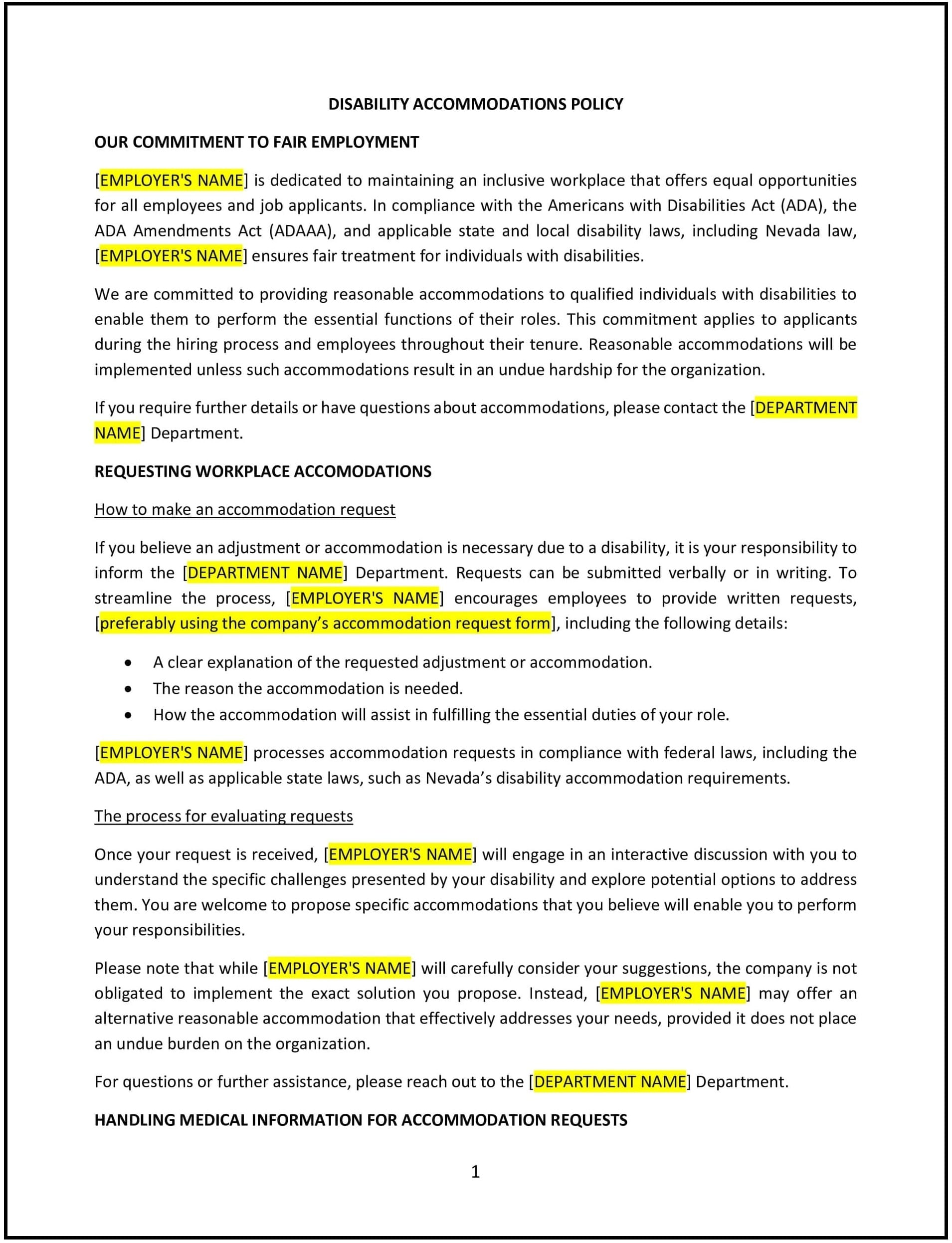Disability accommodations policy (Nevada): Free template
Got contracts to review? While you're here for policies, let Cobrief make contract review effortless—start your free review now.

Customize this template for free
Disability accommodations policy (Nevada)
This disability accommodations policy is designed to help Nevada businesses provide equal access and opportunities to employees with disabilities. The policy outlines the company’s approach to making reasonable accommodations for employees with physical or mental disabilities, in compliance with the Americans with Disabilities Act (ADA) and Nevada state laws.
By adopting this policy, businesses can foster an inclusive work environment, support employees' needs, and comply with applicable legal requirements regarding disability accommodations.
How to use this disability accommodations policy (Nevada)
- Define disability and accommodation: Clearly define what constitutes a disability under the ADA and Nevada law, and explain what types of accommodations may be considered reasonable, such as changes to the workplace, job duties, or work schedule.
- Set the accommodation request process: Outline the steps employees should take to request accommodations, including who to contact (e.g., HR, managers), the information required, and any timelines for submitting requests.
- Provide guidance on assessing requests: Describe the process for reviewing accommodation requests, including how the company will assess whether an accommodation is reasonable and whether it imposes undue hardship on the business.
- Address confidentiality: Ensure that all disability-related information, including accommodation requests, is kept confidential and only shared with those who need to know to implement the accommodation.
- Set expectations for interactive dialogue: Emphasize that employees and the company should engage in an interactive process to discuss potential accommodations, which may involve both parties exchanging information to identify an appropriate solution.
- Clarify types of accommodations: Specify the types of accommodations the company is willing to consider, such as changes in work hours, physical adjustments to the workspace, or changes to job duties, while ensuring that the accommodation allows the employee to perform essential job functions.
- Address undue hardship: Define what constitutes undue hardship for the company, which may include significant difficulty or expense in providing an accommodation, and how this will be assessed on a case-by-case basis.
Benefits of using this disability accommodations policy (Nevada)
This policy provides several key benefits for Nevada businesses:
- Fosters inclusivity: Promotes a workplace culture where employees with disabilities are supported and given the opportunity to succeed in their roles.
- Complies with legal requirements: Helps businesses comply with the ADA and Nevada state laws regarding disability accommodations, reducing the risk of legal action.
- Improves employee retention: By providing accommodations, businesses can support employees with disabilities and reduce turnover by helping them remain productive in their roles.
- Enhances employee morale: Employees who feel supported and valued are more likely to be satisfied and engaged, leading to higher morale and productivity.
- Reduces legal risk: By proactively providing accommodations and addressing requests fairly, businesses can avoid potential discrimination claims and lawsuits related to disability.
Tips for using this disability accommodations policy (Nevada)
- Communicate the policy clearly: Ensure that all employees are aware of the policy and understand how to request accommodations if needed, whether for themselves or others.
- Be responsive to requests: Address accommodation requests promptly and thoughtfully, with a focus on finding practical solutions that meet employees' needs.
- Engage in an interactive process: Encourage open communication between employees and management when discussing accommodation requests to ensure that solutions are mutually agreed upon and workable.
- Maintain confidentiality: Keep all disability-related information private and share it only with those who need to know for accommodation purposes.
- Review and update the policy regularly: Periodically review the policy to ensure it complies with updated laws and remains aligned with the company’s needs and practices.